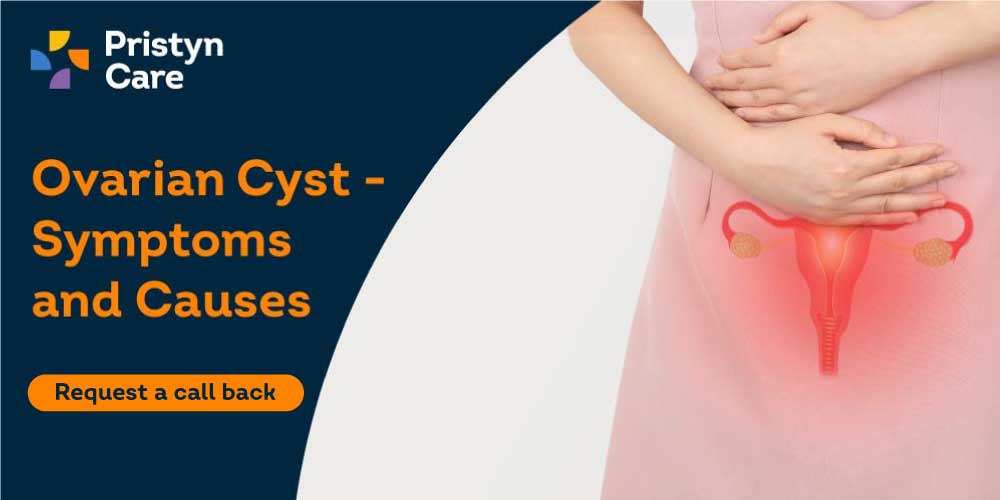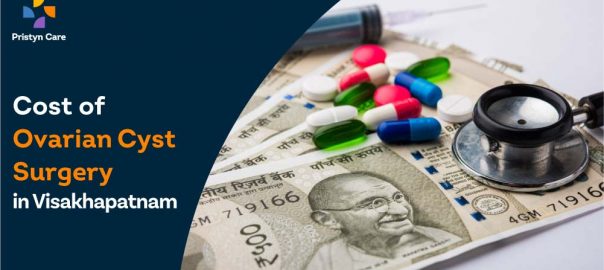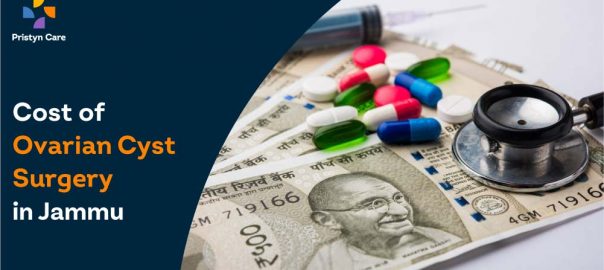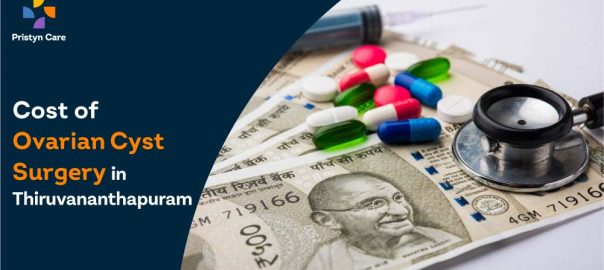![]() Views: 7,732
Views: 7,732
Ovarian Cyst – Symptoms and Causes
Dedicated Support at Every Step!
Our Doctors are available 24 hours a day, 7 days a week to help you!
Table of Contents
What is Ovarian Cyst?
These cysts are generally of two types-, Functional Ovarian cysts and Pathological ovarian cysts. While the former form due to the menstrual cycle, the latter develop due to abnormal cell growth. Both cysts are generally diagnosed in a pelvic exam or a pelvic ultrasound. Even though these cysts are benign in most cases, they can lead to some complications. Therefore, it is advisable to get them checked in time.
No Cost EMI, Hassle-free Insurance Approval
Ovarian Cyst Symptoms
Most women do not experience any discomfort from ovarian cysts and go about their daily tasks without hassles. However, in some cases, these cysts can cause symptoms that can be quite discomforting. These symptoms generally vary for each individual, and so does their severity. So, on that note, we listed below some common ovarian cyst symptoms of that you must look out for:
- Pelvic Pain: Pelvic pain is a common symptom of ovarian cysts that can be dull to severe and sharp.
- Some women may experience pain or discomfort during sex.
- An increased or frequent urge to urinate.
- Constipation or interrupted or slowed bowel movement.
- A change in the menstrual cycle, including irregular periods or heavy periods or lighter periods
- A feeling of fullness after eating little or no food
- Bloating and swelling of the abdomen
- In rare cases, women might face difficulty getting pregnant
- Fever can occur if the cyst is infected
- Sometimes, ovarian cysts can cause unexplained bleeding
In most cases, ovarian cysts go away on their own. However, surgical removal of the ovarian cysts may be necessary in a few cases. The doctors run several diagnostic tests based on your symptoms to understand the severity of the condition and rule out underlying complications. The treatment is chalked out only after a thorough analysis of the symptoms, the findings of the physical examination, and diagnostic tests.
When to see a doctor for Ovarian Cyst Surgery?
Ovarian cysts are harmless, i.e., benign, and do not affect your fertility. The symptoms of ovarian cysts are generally manageable. However, in some cases, these cysts can cause alarming symptoms that require immediate medical intervention. You must get immediate medical attention if you experience the following symptoms:
- Sudden and excruciating abdominal or pelvic pain that does not subside
- Cold and clammy skin, along with rapid breathing and lightheadedness. These can be signs of shock.
- Fever and vomiting, along with unmanageable pain.
Ovarian Cysts Causes
Ovarian cysts are quite common in women with normal menstruation, and also largely affect women who have been through a menopause. As discussed, ovarian cysts are of two types, Functional and Pathological. Both these cysts can occur due to different factors. Let’s understand the causes of both of these types of ovarian cysts:
Causes of Functional Ovarian Cyst:
Functional ovarian cysts chiefly affect women who haven’t been through menopause, as they are connected to the menstrual cycle. The ovaries release an egg each month, protected in a follicle structure. This follicle is filled with fluid which keeps the egg safe, and bursts when the egg is ready to be released. Sometimes, when a sac does not release the egg or releases the egg but doesn’t discharge the fluid, it swells up and forms a cyst. Functional cysts are generally not a cause of concern and do not cause severe symptoms. These cysts are very common and disappear without treatment.
Causes Of Pathological Ovarian Cyst:
Pathological ovarian cysts form due to abnormal cell growth and aren’t linked to the menstrual cycle. Cells responsible for creating eggs, or cells covering the ovary's outer part, lead to these cysts' development. Sometimes, these cysts can swell in size or burst, restricting the blood supply to the ovaries. These cysts can be benign, malign, or borderline. If the cysts are malignant, the doctors might recommend surgery. Also, these cysts can develop before and after menopause.
Certain other factors, such as some underlying conditions, can also lead to the formation of ovarian cysts. Endometriosis is a condition in which the tissue lining the uterus grows inside the uterus. Sometimes, blood-filled cysts start to form in this tissue. PCOS (Polycystic Ovary Syndrome) is another condition that can lead to the formation of cysts on your ovaries.
Risk Factors Of Ovarian Cysts
There are several factors that can put you at an increased risk of developing ovarian cysts. These risk factors include:
- Hormonal issues
- Pregnancy
- Endometriosis
- Serious Pelvic Infection
- History of ovarian cysts
Experiencing Ovarian Cyst symptoms? Don’t fret! Get in touch with Pristyn Care’s experienced gynecologists and get an accurate diagnosis and treatment for your condition! Call us directly or fill out our website form to book your appointment today!










